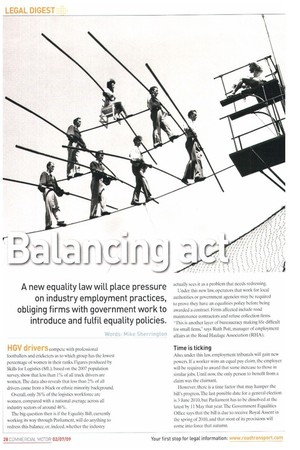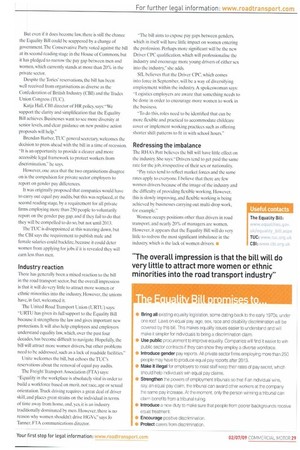A new equality law will place pressure on industry employment
Page 28

Page 29

If you've noticed an error in this article please click here to report it so we can fix it.
practices, obliging firms with government work to introduce and fulfil equality policies.
Words: Mike Sherrington HGV drivers compete with professional footballers and cricketers as to which group has the lowest percentage of women in their ranks. Figures produced by Skills for Logistics (SfL), based on the 2007 population survey-, show that less than 1% of all truck drivers are women. The data also reveals that less than 2% of all drivers come from a black or ethnic minority background.
Overall, only 26% of the logistics workforce arc women, compared with a national average across all industry sectors of around 46%.
The big question then is if the Equality Bill, currently working its way through Parliament, will do anything to redress this balance, or, indeed, whether the industry actually sees it as a problem that needs redressing.
Under this new law, operators that work for local authorities or government agencies may be required to prove they have an equalities policy before being awarded a contract. Firms affected include road maintenance contractors and refuse collection (inns. "This is another layer of bureaucracy making life difficult for small firms," says Ruth Pott, manager of employment affairs at the Road Haulage Association (RHA).
Time is ticking
Also, under this law, employment tribunals will gain new powers. If a worker wins an equal pay claim, the employer will be required to award that same increase to those in similar jobs. Until now, the only person to benefit from a claim was the claimant.
However, there is a time factor that may hamper the bill's progress. The last possible date for a general election is 3 June 2010, but Parliament has to be dissolved at the latest by 11 May that year. The Government Equalities Office says that the bill is due to receive Royal Assent in the spring of 2010, and that most of its provisions will conic into force that autumn.
But even if it does become law, there is still the chance the Equality Bill could be scuppered by a change of government. The Conservative Party voted against the bill at its second reading stage in the House of Commons, but it has pledged to narrow the pay gap between men and women, which currently stands at more than 20% in the private sector.
Despite the Tories' reservations, the bill has been well received from organisations as diverse as the Confederation of British Industry (CBI) and the Trades Union Congress (TUC).
Katja Hall, CBI director of HR policy. says: "We support the clarity and simplification that the Equality Bill achieves. Businesses want to see more diversity at senior levels, and clear guidance on new positive action proposals will help."
Brendan Barber,TUC general secretary, welcomes the decision to press ahead with the bill in a time of recession. "It is an opportunity to provide a clearer and more accessible legal framework to protect workers from discrimination." he says.
However, one area that the two organisations disagree on is the compulsion for private sector employers to report on gender pay differences.
It was originally proposed that companies would have to early out equal pay audits, but this was replaced, at the second reading stage, by a requirement for all private firms employing more than 250 people to voluntarily report on the gender pay gap, and if they fail to do that they will be compelled to do so, but not until 2013.
The TUC is disappointed at this watering down, but the CBI says the requirement to publish male and female salaries could backfire, because it could deter women from applying for jobs if it is revealed they will earn less than men.
Industry reaction
There has generally been a mixed reaction to the bill in the road transport sector. but the overall impression is that it will do very little to attract more women or ethnic minorities into the industry. However, the unions have, in fact, welcomed it.
The United Road Transport Union (URTU) says: "URTU has given its full support to the Equality Bill because it strengthens the law and gives important new protections. It will also help employees and employers understand equality law, which, over the past four decades, has become difficult to navigate. Hopefully, the bill will attract more women drivers, but other problems need to be addressed, such as a lack of roadside facilities."
Unite welcomes the bill, but echoes the TUC's reservations about the removal of equal pay audits.
The Freight Transport Association (FTA) says: "Equality in the workplace is absolutely vital in order to build a workforce based on merit, not race, age or sexual orientation. Truck driving requires a great deal of driver skill, and places great strains on the individual in terms of time away from home, and, yes, it is an industry traditionally dominated by men. However, there is no reason why women shouldn't drive HGVs," says Jo Tanner. FTA communications director. "The bill aims to expose pay gaps between genders, which in itself will have little impact on women entering the profession. Perhaps more significant will be the new Driver CPC qualification, which will professionalise the industry and encourage more young drivers of either sex into the industry," she adds.
SIT., believes that the Driver CPC, which comes into force in September, will be a way of diversifying employment within the industry. A spokeswoman says: "Logistics employers are aware that something needs to be done in order to encourage more women to work in the business.
"To do this, roles need to be identified that can be more flexible and practical to accommodate childcare cover or implement working practices such as offering shorter shift patterns to fit in with school hours."
Redressing the imbalance
The RHA's Pott believes the bill will have little effect on the industry. She says: "Drivers tend to get paid the same rate for the job, irrespective of their sex or nationality.
"Pay rates tend to reflect market forces and the same rates apply to everyone. I believe that there arc few women drivers because of the image of the industry and the difficulty of providing flexible working. However, this is slowly improving, and flexible working is being achieved by businesses carrying out multi-drop work, for example."
Women occupy positions other than drivers in road transport, and nearly 20% of managers are women. However, it appears that the Equality Bill will do very little to redress the most significant imbalance in the industry, which is the lack of women drivers. •
















































































































































